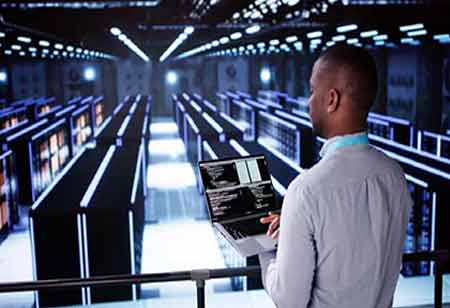THANK YOU FOR SUBSCRIBING

Digital Transformation in Construction: Trends, Challenges, and Leadership Insights
Bisrat Solomon Degefa, Entrepreneur in Residence at Antler

 Bisrat Solomon Degefa, Entrepreneur in Residence at Antler
Bisrat Solomon Degefa, Entrepreneur in Residence at AntlerThe construction industry is fraught with key trends like AI, IoT, and AR/VR, emphasizing their potential to enhance efficiency and innovation. Bisrat Solom Degefa, entrepreneur in residence at Antler, sits down to discuss the ways to achieving a successful digital transformation in the sector.
Shift to a Startup
With senior leadership roles in leading construction firms under my belt, i gained deep insights into the industries inefficiencies and the potential for innovation.
The corporate world bureaucratic challenges often slowed progress, propelling my drive for innovation and leading me to establish a startup. This new venture provided the flexibility to introduce new solutions that optimises traditional corporate processes.
This new venture provided the flexibility to introduce solutions unrestricted by traditional corporate limitations. As the construction sector stands at the brink of a digital revolution, incorporating AI, IoT, and AR/VR, I aimed to be at its forefront, leveraging opportunities to address industry challenges. Joining the early-stage founder program was pivotal, offering mentorship from a network of seasoned professionals, aiding in avoiding common missteps, and accelerating growth.
My corporate experience illuminated my true passion: initiating and nurturing projects from the ground up. My deep industry understanding highlighted market gaps, particularly the demand for technology-driven solutions that could revamp processes and boost productivity. Introduced to Antler, a venture capital firm dedicated to nurturing innovative founders, I saw an opportunity to further my entrepreneurial journey. Recognizing the inherent risks of entrepreneurship, I believe that with a dedicated team, clear vision, and impeccable execution, the potential rewards are monumental. Now, within an early-stage founder program, I am ready to apply my extensive knowledge to spearhead innovations and make a significant impact in a rapidly evolving industry.
Latest Construction Tech Trends
Digital transformation is revolutionizing the construction industry, bringing in a wave of technologies that enhance efficiency, cost-effectiveness, and innovative project approaches. Key trends include Artificial Intelligence (AI) and Machine Learning (ML) for data analysis, the Internet of Things (IoT) for site monitoring, Augmented and Virtual Reality for immersive visualizations, cloud-based tools for collaboration, and Big Data for optimized decision-making. Additionally, emerging technologies like blockchain promise streamlined supply chain management, while tools focused on sustainability aim to bolster eco-friendly construction. Techniques like 3D printing, drones, robotics, digital twins, and Building Information Modeling (BIM) further bridge the digital and physical realms, facilitating more precise, timely, and collaborative construction processes.
However, merely adopting these technologies isn't enough. Construction firms must commit to investing in their workforce's training, refining business strategies, and nurturing a culture centered on innovation. This holistic integration of digital tools promises profound enhancements in designing, planning, and executing construction projects, paving the way for an industry that's not only technologically advanced but also more sustainable and collaborative.
Digital Challenges in Construction
The construction industry has traditionally lagged in adopting new technologies, facing several obstacles. Key challenges include a cultural resistance to change, a gap in digital literacy among workers, fragmentation among various stakeholders, and the high initial costs associated with digital implementation. Other issues encompass interoperability difficulties between different digital tools, concerns about data security, compliance with regulatory standards, the unique nature of construction projects that resist standardization, a predominant short-term focus, unclear immediate ROI, complexities in the supply chain, and a shortage of digitally skilled professionals.
To address these hurdles, leaders in the construction sector must adopt a strategic mindset. This involves emphasizing the importance of change management, continuous upskilling, engaging all stakeholders, and recognizing the long-term advantages of digital adoption, even if immediate returns are not evident. Investing in the future through digital transformation ensures the industry's growth and sustainability.
Advice on Digital Transformation
Digital transformation in construction promises enhanced efficiency, reduced costs, and improved safety. For leaders spearheading this change, it's crucial to have a clear strategy aligned with organizational goals. Engage stakeholders from all levels to understand their needs and pilot initiatives on smaller projects to test and iterate before scaling. Training and managing the cultural shift are vital, as is unlocking the potential of vast data generated in construction through robust analytics. Promote collaboration using digital tools and stay updated with evolving tech trends. Prioritize data security and ensure compliance with regulations. Embrace continuous learning and measure successes through clear KPIs. Collaborate with external partners for fresh insights and be prepared to adapt and persist through challenges.
The journey of digitally transforming the construction realm is a blend of technology, people, and processes. Leaders must be committed, flexible, and resilient, ensuring they focus not only on the latest tools but the cultural and strategic shifts necessary for successful integration. By doing so, they pave the way for a more innovative and efficient future in construction.
Read Also
Where Safety Really Lives: Between the Plan and the Jobsite
Accelerating the Shift Toward Data-Led Construction Excellence
Building Projects Through People, Planning and Culture
Innovating the Future of Construction: Insights From Power Design's Leadership
Advancing Construction with Technology and Care
Technology as a Strategic Advantage in Preconstruction

 Copyright © 2026 All Rights Reserved | by:
Copyright © 2026 All Rights Reserved | by: Construction Tech Review
| Subscribe | About us | Sitemap| Editorial Policy| Feedback Policy














